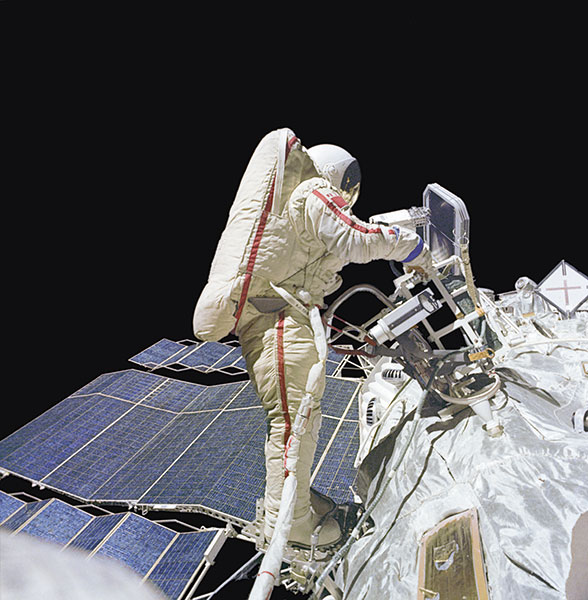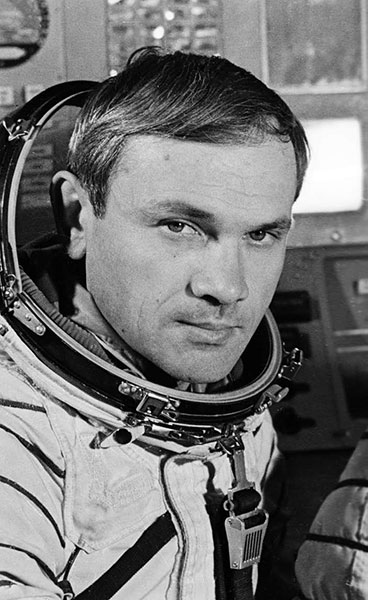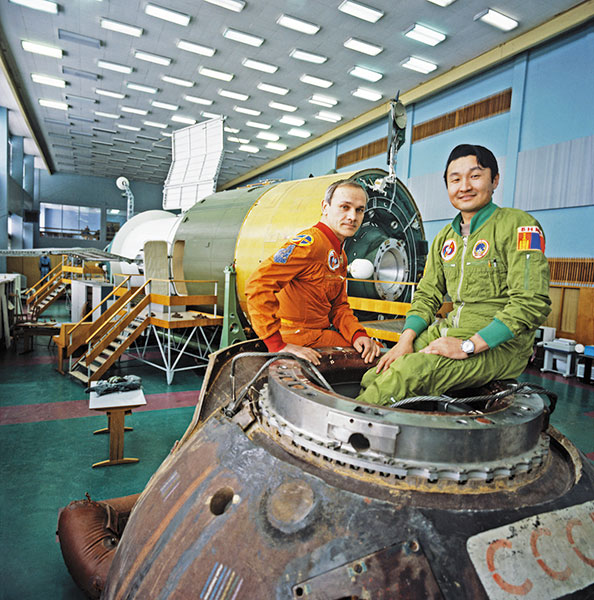![]() — Russkiy Mir Foundation — Journal — Articles — “It was from outer space that studying Russian became popular” – Interview with Vladimir Dzhanibekov
— Russkiy Mir Foundation — Journal — Articles — “It was from outer space that studying Russian became popular” – Interview with Vladimir Dzhanibekov
 “It was from outer space that studying Russian became popular” – Interview with Vladimir Dzhanibekov
“It was from outer space that studying Russian became popular” – Interview with Vladimir Dzhanibekov
“We see it! – almost a scream over the loudspeaker. And then – silence.
– The approach is steady, angular rate within the hundredths...
– Let’s work according to schedule, guys – the Earth gave encouragement.
– I’m doing the readings... This is the voice of Dzhanibekov.”
This is how Viktor Savinykh’s book Notes from the Dead Station describes the docking of Soyuz T-13 with the Salyut-7 station. At the helm of the expedition was the astronaut Vladimir Dzhanibekov. Twenty-three years have passed since that voyage. What has changed in space exploration over this time? What language is spoken on the International Space Station? About these and many other things we spoke with Major General Vladimir Dzhanibekov.

– General Dzhanibekov, is it true that the novel Andromeda: A Space-Age Tale got you interested in space?
– In general, yes. It was a wonderful feeling the day they launched the first satellite. This happened on October 4, 1957. At the time I was studying at school in Suvorov, and just a couple of days before this event we had returned from the cotton harvest. So there you have it, the first satellite, and our physics teacher telling us about space... After school I went to the library and immediately reached for Tsiolkovsky and read Dreams of Earth and Sky. I went to return it and saw a brand-new copy of Yefremov’s Andromeda: A Space-Age Tale. I read this book in one night under a blanket with a small homemade flashlight and was simply stunned. After that, well here we go again. I developed a passion for astronomy, telescopes, books about space. In short, a space fever in the best sense of the word had begun.
– How are things with Russia’s space sector today?
– The Russian space sector today is only providing viability to the International Space Station. We are performing services. Unfortunately, it doesn’t have its own large-scale scientific research. We’re not engaging in science like before, in the solutions to fundamental problems in space. The scientific work on the unmanned program has been dramatically decreased. With regard to manned space activities, not all is well on that front either. The young astronauts who arrived 15-20 years ago have yet to make a space voyage. On the one hand, of course, it’s sad, but on the other... Even if we stop all space work, sooner or later the time will come when a new Korolev is born, a Gagarin will come again to Russia. There are always things that defy explanation. People will always be breaking into space. By the way, Sergey Korolev wanted not just to fly into space, but immediately set off for Mars.
– Right now there are several countries, including Russia, that are preparing for an expedition to Mars. Is it possible that we’ll get revenge for the moon and that Russian will be the first language heard on Mars?

– I believe that sooner or later such an expedition will take place, and it should probably be an international one. It is much easier for the entire world to carry through with such an ambitious program. This is something quite enormous in terms of the financial costs, scientific potential, and, most importantly, the program is something that could join the nations of the earth - both spiritually and intellectually. After the expedition is carried out, there will appear a new generation of earthlings that will think in very different categories, just as happened after the launch the first satellite, and especially after the first flight of Yuri Gagarin. The world began to change rapidly. Very rapidly. The reaction was different, but it was powerful.
– In working with foreign astronauts, you’ve had the opportunity to pay a lot of attention to them. What were they stronger in, and what could they get from working with Russians?
– As for stronger-weaker, I didn’t make such assessments. We are all people. I flew with a Mongolian astronaut and a French one. There was also the Soyuz-Apollo project, and I was part of the reserve crew for that. We are not weaker than the Americans, and to talk about how they are stronger doesn’t work. They made their mistakes, screw-ups and blunders, just like we did. As for the Russian language, well, the Mongolian astronauts often spoke even better Russian than we did.
– What’s the main language that’s used on the International Space Station?
– It’s a mix of Russian and English, whatever a person is more comfortable with. Our astronauts studied English perfectly, so there’s no language barrier.
– Do the foreign astronauts know Russian?
– In this respect the spread is much larger, even among the Americans. Even still, they try to speak to us in Russian. For the most part, there aren’t any problems. A certain kind of international language takes shape, probably with lots of slang.
– The first words in space were spoken in Russian... What do you think about the idea of making April 12 World Russian Day?

– I think that it’s not a bad idea. If you already have a Russian Day, then why not? The first words – let’s go (poekhali) – blew open the whole world. Studying Russian became popular. People from all around the world began to show a much deeper interest in our country.
– In 1984, you flew together with Svetlana Savitskaya. How did the other astronauts react to having a woman on board?
– Svetlana’s presence on board provided discipline for the men. Because of her we took better care of ourselves. She had a positive influence on the atmosphere at the station. She’s also a very well-versed specialist, a professional. It was very easy to work with her. She understood clearly what needed to be done and resisted any attempts from the men to help. That’s a really high level, a very high bar to meet.
– You completed your fifth flight with Viktor Savinykh. Is it right that it was one of the most difficult? I mean the docking of Soyuz T-13 with the Salyut-7 station...
– There was a problem with the docking because we were dealing with an “uncoordinated object.” There wasn’t a radio channel that could have provided us with information about the parameters of the approach, so we had to manually and visually deal with the approach. It was an extremely difficult task. The ship didn’t have the fuel resources that would have allowed us to be in outer space forever, making new attempts to approach and again “build” an orbit. Any starting of the engine would have changed the orbit. Well, by that time the mission control center had a very decent training base. We could practice such major parts of the operation on the ground.
– Did your impressions of space correspond to what you actually saw there?
– Many astronauts really vividly tell us what we should see through the porthole: sunrises, sunsets, forests, lakes, oceans, different colors of water; it’s another philosophy in principle. There is something majestic, breathtaking – it’s like the anthem of life, the anthem of the universe! On the other hand, gravity is a very unusual situation. Those who are faced with weightlessness for the first time handle it in their own way. Ironically, it turns out that very healthy people have difficulty in adapting to these conditions, and those who are frequently sick have an easier time. It’s probably because their immune system throughout life is faced with all kinds of diseases and is better able to cope with the new state than healthy people are. Every man in space experiences unpleasant sensations. For two to four days, people simply suffer. But once you adapt to weightlessness you have an entirely new state of life, a new spirit.
– When you were in space, did you miss the earth more, or do you miss space more being on the earth?
– I didn’t miss the earth at all, because my flights were always short. After the first flight, I felt as if I had been given the show Seventeen Moments of Spring to watch and was told “there won’t be any more!” I was always envious of those who went on the long expeditions. I really wanted to work like that, being both on and off the station. But it didn’t happen. I would like to do an expedition like one to Mars, for example.
Author: Lyubov Kuryanova




